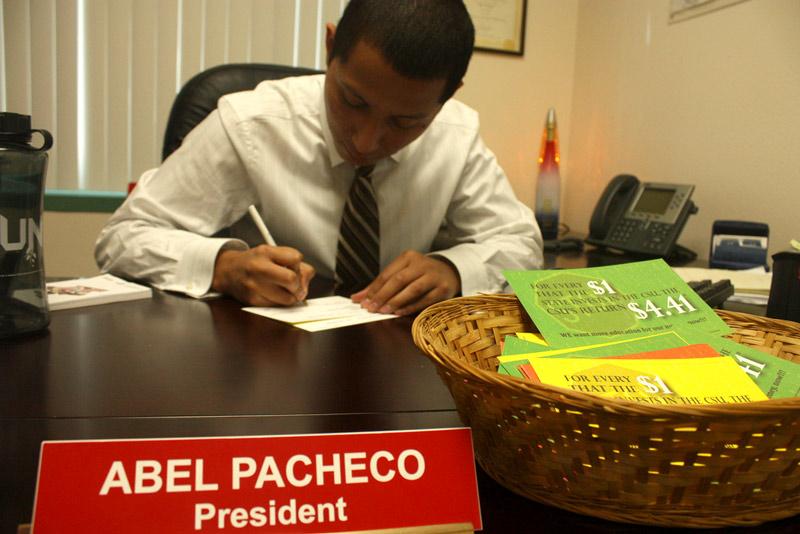
On a crisp sunny afternoon, junior finance major Chris Butner approaches the table set up by Associated Students (A.S.) in the middle of campus to get students to sign colorful postcards to protest the 32 percent fee increase.
When Butner, 38, is asked to sign a postcard, he does not hesitate. He said he was tired of not being able to get into the classes he needs to graduate on time.
“I’m having to play the game of trying to get into classes,” he said. “By signing the card, it might make a difference and help stabilize the fee hikes.”
But it hasn’t been easy for A.S. senators volunteering at the tables to get signatures, said A.S. President Abel Pacheco. A.S. senators had been asking for signatures since the morning, and in the middle of class time, there was hardly anyone walking by.
Pacheco said the goal was to get 10,000 postcards signed in one week before students and A.S. senators became busy with finals. He added that the cards could be signed by students, faculty and parents and that the postcard campaign was a “collaborative effort” between Sacramento State, CSU Long Beach and CSU Los Angeles.
“We want to let political leaders know that students are paying attention,” Pacheco said.
The idea was developed during a conversation between Pacheco and other colleagues, who will be attending the California State Student Association conference in San Francisco. They will be delivering the multicolored postcards and have a press conference at the state Capitol on their way back, he said.
“We want to deliver the postcards to Gov. Schwarzenegger before he releases his mid-year budget,” Pacheco said.
Junior Cynthia Medrano, sociology major and senator at large IV, was also trying to get students to sign the postcards. She also said it was hard to get students to sign the postcards as they walked by.
“Students don’t know what it’s all about,” said Medrano, 20. “It’s complicated to get their attention.”
She added that the three most popular responses from students when asked to sign the postcards were “No, thanks,” “Sorry, no time,” and, “I’m good.”
Medrano, along with other senators, are also making presentations in classes, and she said students were more responsive and willing to participate once they were told about the campaign. She said that students were not showing apathy toward the crisis. Instead, they were reacting to having strangers approach them to sign cards.
“We are trying to voice the concerns of the student body,” Medrano said. “And as representatives of the student body, we have a responsibility to do.”
Joaquin Beltran, A.S. president from Cal State LA, said in a phone interview that they did not have the postcards printed yet, but would start collecting “as many signatures as possible” as soon as they got them.
“We are trying to make a case for higher education,” Beltran said.
He added that they were ready to do a “person-to-person connection” to explain to students what they were trying to accomplish. He said the ultimate goal was to keep students involved in the long run.
“They’re symbolic (the postcards), but they show that students are active and that they do care,” Beltran said. “It will be a sign to the governor and the legislature that we are not going to take a back seat.”
Beltran added that it was better to act now because “next year is looking like it’s going to get worse.”
Pacheco said people are always asking for solutions to the budget crisis, and that is why they choose to write “For every dollar that the state invests in the CSU, the CSU’s return $4.41” on the cards.
“We are telling you in clear numbers that the solution is investing in us,” he said.
A.S. will be at the Oviatt Lawn until Friday, Dec. 8 from 8:30 am to 5:30 p.m.





